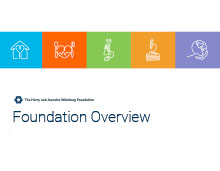
When most think of adapting an older adult’s home for independent living, they may envision grab bars in the shower and handrails near the stairs. Although the CAPABLE (Community Aging in Place, Advancing Better Living for Elders) program certainly includes such critical items, it also allows older adults to age in their communities with dignity, confidence, and resilience.
The five-month program — managed by Colorado-based Care Synergy, a network for community-based home health care providers — is one of the Foundation’s core investments in supporting older adults so they can remain independent. Developed through research conducted at the Johns Hopkins University School of Nursing, CAPABLE combines repair services with health and occupational therapy services to improve independence and mobility, manage chronic symptoms, and decrease health care costs for older adults struggling with everyday activities. The program’s multidisciplinary approach enables participants to determine the goals that are important to them, and that affect quality of life and their ability to function.
The Weinberg Foundation has funded CAPABLE since 2018, along with other programs that help low-income older adults age independently in community. Grants have supported expanding the program throughout nearly a dozen states, including Alaska, California, and Maryland — and providing vital services to 980 low-income adults. Most recently, a Foundation grant allowed North West Housing Partnership to extend the CAPABLE service area to provide home repairs for 85 lower-income older adults in the western suburbs of Chicago.
During their time in the program, participants collaborate with a registered nurse, an occupational therapist, and a home modifications contractor to identify goals and design customized support to achieve those objectives. The nurse’s initial assessment focuses on pain, depression, strength and balance, or medications, and how they might negatively affect participants’ daily function or inability to achieve their goals. The occupational therapist concentrates on the ability to perform everyday activities — such as cooking or walking to the bathroom — identifies obstacles, and then develops solutions to attain these functional goals. The handyman provides the repairs, modifications, and assistive devices to coincide with therapy follow-up and training.
Ultimately, participants determine what they wish to achieve and prioritize. The team then works in tandem to ensure optimal results for each individual, whether it’s lowering the stovetop to make it accessible for someone in a wheelchair or working on finger strength and providing a device to help reach items in a cabinet.
For example, for a program participant in Baltimore whose arthritis hindered her love for knitting, a CAPABLE assessment resulted in a simple solution with far-reaching effect. After receiving an inexpensive pair of large knitting needles that were easier to grip, she began knitting again and was even connected with a local hospital’s maternity ward so she could donate her handmade hats and blankets for newborns.
The Foundation has also helped bring the program to veterans throughout the country. More than 4 million veterans age 65 and older have difficulty with core functions — such as seeing, hearing, and mobility, among others — and are low income. A grant to the Philadelphia Research and Education Foundation is supporting the implementation of CAPABLE across nine Veterans Affairs medical centers and 45 surrounding community-based outpatient clinics in and around Pennsylvania, including parts of Delaware and New Jersey, which will bring these services to over 400 older adults.
Beyond the difference it makes in individual lives, research has shown that CAPABLE has provided more than six times the return on investment, with roughly $3,000 in program costs per participant yielding more than $30,000 in saved medical costs, such as fewer emergency room visits due to falls and overuse or misuse of medications. Additionally, 75% of low-income older adults on Medicaid and Medicare who participated in CAPABLE indicated an improvement in their self-care over the course of five months.
The Foundation will continue to promote the expansion of this model to more communities across the nation. The hope is that these effective services will become available for all older adults at no cost, helping them live at home with dignity.




